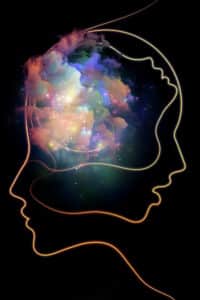Integrative Counselling Definition
An integrative approach to counselling and psychotherapy involves drawing upon more than one modality. The blending of relevant theory and interventions an approach is formed to suit the needs of the client.
Integrative Counselling Model
Integrative counselling can offer a tailored approach for working with clients. As a result it allows the counsellor to practice in a way which reflects their theoretical and philosophical viewpoint.

Difference between eclectic and integrative Counselling
Both an integrative and an eclectic approach to psychotherapy involve using multiple modalities in the therapy room. So how do they differ? Here are some of the main differences between integrative and eclectic psychotherapy:
Integrative counselling
- Involves a blending of theory and practice.
- Individualised, tailored model.
- Considers similarities and differences between relevant models when developing an approach.
Listen to Episode 14 of the Counselling Tutor Podcast where Ken and Rory discuss the differences between integrative vs eclectic counselling.
Eclectic Psychotherapy
- Uses different techniques in an ad hoc way, like having a tool box of therapeutic techniques to draw upon when needed.
- Does not concern itself with theoretical conflicts between models.
- Does not incorporate modalities into a new model.
What does Integrative Counselling Look Like?
Integrative counselling will look different in every therapeutic relationship, because each therapist brings their own experiences and perspectives to the encounter, and because the model is applied flexibly to meet the needs of the individual client.
Integrative counselling will look different in every therapeutic relationship...
Integration of different modalities is likely to involve applying relevant techniques in a complimentary way, as well as thinking about the client’s process through different lenses (for example, looking at relationships through a TA model or humanistic theory) and using these ideas to help make sense of what is happening for them.
It is important that the therapist continues to develop a sound knowledge of all areas of their integrative model. How it works with an individual client will depend on the relationship, and will perhaps involve an element of intuition on the therapist’s part, which is enabled by a good therapeutic alliance.
Free Handout Download
4 Types of Integrative Therapy
Pros and cons of Integrative Counselling
Main Benefits:
- Can create a flexible and dynamic approach to suit a wide range of clients.
- Allows the therapist to consider their theoretical perspectives and create a model that works for their practice.
- Can be useful for clients who favour a mixture of behavioural and relational approaches.
- Incorporating different modalities provides scope for the therapist to continue to develop their practice as their career progresses, through continuing professional development and other learning.
Main Criticisms:
- A therapist using a mixture of modalities could be confusing for a client.
- In working with so many different modalities, the therapist may not develop sufficient depth in any. Concerns about an integrative therapist becoming a ‘Jack of all trades, and a master of none’.
- Therapists’ unconscious motivations for selecting modalities or using them with clients may need more scrutiny to ensure they serve the needs of the client, not the therapist.
- Purist person-centred therapists have argued that the modality cannot be integrated with more directive approaches.
Integrative therapy concepts
Integrative psychotherapy is often understood to include the idea of integration in the client’s process. This is the notion that we are all made up of different psychological parts, some of which may be in conflict with each other or denied to our awareness. Many schools of therapy subscribe to the idea that integration of these parts is an integral part of the therapeutic process.
Carl Rogers called this the actualising tendency, in which aspects of ourselves, previously disowned or shunned, can be explored and accepted as we move through the seven stages of process.
Similarly, gestalt therapy works with the concept of the integrated self, and there is particular emphasis on the wholeness of the mind and body – that these parts of ourselves are unified and cannot be separated.
In psychodynamic terms, Carl Jung discusses the process of individuation, whereby the client brings unconscious elements of their personality into awareness, and can then integrate these previously unknown areas of self into their psyche.

Integrative counselling can incorporate some or all of these theoretical perspectives to help clients to engage with the process of personal integration.
Free Handout Download
4 Types of Integrative Therapy
Advantages of an integrative approach in counselling
Integrative counselling and psychotherapy is a relational process. This means that the therapeutic relationship is an essential ingredient in the work that the therapist and counsellor do together.
The alliance between client and therapist is the vessel for the therapeutic journey; when it is valued and nurtured, it provides the safety needed for the work to take place.
In integrative counselling, the developing relationship allows the therapist to adapt their approach to the needs of the client, and for the client to feel safe enough to explore and express their needs. Integrative therapy is a collaborative process, and the relationship is central.
Erin Stevens 2018